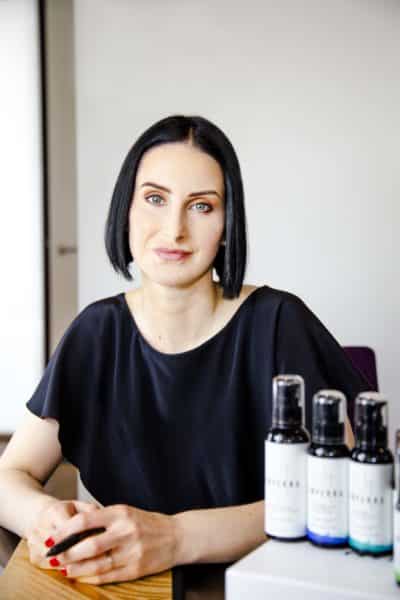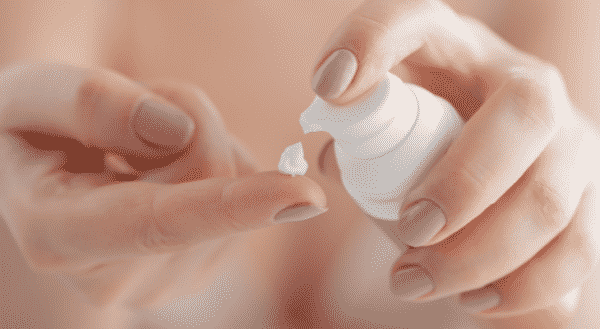Why is probiotic skincare creating such a buzz?
Probiotics have recently made the move from supplements and sauerkraut to skincare, popping up in everything from night creams and masks to cleansers and serums. What’s next?
A few years ago, one of the world’s biggest skincare brands made a decision. While Lancôme’s Advanced Génifique serum was already a bestseller, the 10-year-old formulation was about to undergo an update, one that involved, well, bugs.
Relaunched in 2019, the iconic anti-ageing face serum had been reformulated to contain probiotics designed to act on the skin microbiome. Many other brands have followed suit, including heavy hitters such as Dior and Estée Lauder, which even partnered with a leading microbiome research company to understand how the skin responds to probiotics when they’re applied topically.
For Kiri Yanchenko, founder and director of AMPERNA, an Australian skincare brand that features an active probiotic complex as its hero ingredient, big brands taking that route feels a bit like validation. Launching AMPERNA in early 2018 after five years’ worth of research and development, Yanchenko began experimenting with topical probiotics for her own skin in 2012.
“A year or two prior to that, I began taking medications for stress and hives due to an extremely stressful life event,” she says. “Thanks to the stress and side effects from the medication, my body just gave up and I ended up in hospital. I had to stop taking one of the medications I’d been on; within 72 hours, I’d developed severe pustular acne.
“I’ve always had very reactive skin, so it’s very hard for me to use standard topical acne treatments and I didn’t want to take any more medication, either. The idea for the brand really started from there.”
A few months later, feeling like she was benefiting from taking a probiotic supplement, Yanchenko imported a topical probiotic ingredient that her skin not only tolerated but responded to. The foundation of what would eventually become AMPERNA was laid.

Kiri Yanchenko; Founder & Director at AMPERNA
Making sense of the skin microbiome
The first thing to know is that the skin is covered in microbes. Dr Michele Squire, scientist and founder of skincare consulting service Qr8 MediSkin, describes them as a huge collection of bacteria, viruses, fungi and other microscopic organisms. “There are at least a billion microbes on every square centimetre of your skin, and they live right down in the dermis too – not just on the surface,” says Squire.
Together, these microbes make up what’s called the skin microbiome. “We know that our skin microbiome, like that of our gut, has several functions in healthy skin,” says Squire. “It prevents growth of disease-causing bugs by crowding them out and releasing natural antimicrobials, creates an acidic environment to inhibit the growth of disease-causing organisms and communicates with our immune system to keep it operating normally.
“We also know that some skin diseases, such as acne, eczema and dermatitis, are associated with changes in the skin microbiome, which is called dysbiosis.”
Even though research is still in the initial stages, a 2020 study reviewing evidence about how topical probiotics impact dermatological diseases found promising results, particularly when it came to acne and dermatitis. “I hope we can one day replace topical antibiotics for skin conditions like acne and rosacea with targeted probiotics,” says Squire.
That’s Yanchenko’s wish, too. “Initially, I just wanted to formulate one product – a steroid alternative because I’m so allergic and reactive to a lot of things and I didn’t want to keep using steroid creams, which never really helped me much anyway. But when the samples we’d been formulating started making such a big difference to my own skin as it was recovering, I knew we were onto something.
“Eventually my idea expanded to wanting to create a skincare range that could be tailored to help any skin concern.”

The prospect of improving healthy skin
Squire says the next frontier, at least as far as the science goes, is quantifying and qualifying the precise benefits for topical probiotics on healthy skin.
“One small study has shown that a bacterium, Nitrosomonas eutropha, applied topically, could improve wrinkles and pigmentation in healthy skin, making it a promising area of research,” she says. “But a great deal of study is still needed to understand if – and how – topical treatments like probiotics, prebiotics and postbiotics impact the healthy skin microbiome, and if so, what the right microbe or combination of microbes and dosage looks like.”
Yanchenko says AMPERNA has already been embraced by people with a variety of different skin types, including those without specific skin issues. “Our range definitely isn’t just for people with skin concerns,” she says. “From the very beginning, I went down the route of wanting my own formulas and wanting them to be perfect. So our products are formulated with high-quality, tried-and-tested ingredients and it’s not just about the probiotics, either. Every ingredient has been rigorously tested and there’s research behind it. If it’s included in an AMPERNA product, there’s a reason for it to be there.”
Microbiome skincare has been labelled the fastest growing segment in the skincare industry. “After attending so many ingredients seminars and closely following what other brands are bringing out, I don’t think we can classify probiotics in skincare as just a trend now,” says Yanchenko. “I think we’ll only see more and more brands jumping onboard.”
Squire agrees: “The science of topical probiotics is an emergent but exciting field. As more research effort is dedicated to determining which probiotics target specific skin issues and the research expands to include improving healthy skin, I think we will see more probiotics appearing in our skincare.”
AMPERNA will be exhibiting at Naturally Good 6-7 June 2022, ICC Sydney. To discover more about this innovative brand, browse their product range here.
-
Enquire!
- Register
